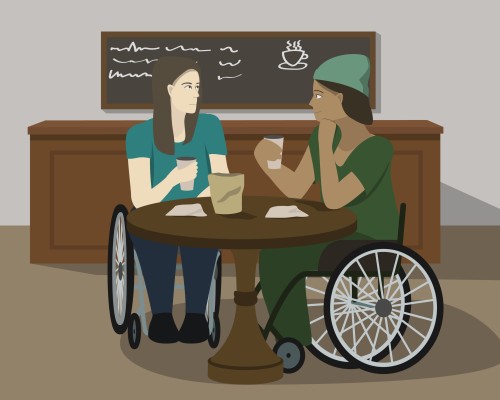Allow Yourself to be Vulnerable (Mental Health Series Part Nine)

Welcome back to this series on mental health. I am excited that you have come back for one of my favourite parts of this series! Let’s discuss vulnerability.
“Let ourselves be seen, love with our whole hearts even when there’s no guarantee, practice gratitude and lean into joy, and believe that you are enough.” — Brené Brown
Being vulnerable with yourself and others, even with a therapist, is often incredibly challenging. Laying bare your genuine, unfiltered thoughts, emotions, and experiences is not always easy.
Expressing vulnerability has for so long carried negative connotations. People often say vulnerability equals weakness, and that weakness makes someone unworthy or lesser. Although these messages are constantly impacting our perceptions, they are so far from the truth.
I find being vulnerable about your unfiltered thoughts, emotions, and experiences is even more complicated after sustaining an SCI. As someone with an SCI, you are immediately considered a part of a vulnerable group in society. Someone who is mentally, physically, financially, and systemically disadvantaged. Someone whose life is depressing. Someone who is either blamed for what happened to them or a victim of someone else’s careless actions. Someone incapable of independence who needs to rely on others and is, therefore, a burden. Although systemic disadvantages are slowly beginning to lessen for us and these other views are beginning to change, they are still prominent in society and make it even more challenging for us to be honest with ourselves and others.
Reasons why it can be hard to be vulnerable:
- Fear of other peoples’ reactions
- For example, you may not want people to know you were drinking or not wearing a seatbelt when you were injured. You may not want to talk about how you feel about those choices out of fear of blame rather than empathy. For example, I cannot remember whether I was wearing my seatbelt when I sustained my SCI, and I still have not entirely processed my thoughts around the possibility that I was not. This discomfort stems from the messages I received from others, such as the message I received when I was still in PICU (pediatric intensive care unit), from an acquaintance over Facebook that shamed me for not wearing one.
- You may be sick of people pitying you or thinking your life is depressing due to your SCI
- So, it is harder to tell others about it when you are experiencing a challenging moment associated with your injury. For example, on many levels, I am thankful for what happened to me and how my SCI has changed my life. I know I am a happy person who is worthy. However, there are moments in my life that my SCI has made challenging. I used to be so terrified to talk about those moments or even process them myself out of fear of pity, being misunderstood, or of proving an inaccurate, negative stereotype.
- You may need to ask for help from others, but you fear someone thinking you are a burden
- In reality, everyone needs help in different ways. And that is okay! But you may feel extremely vulnerable and ashamed to ask others to help you do things. This shame may inhibit you from asking a person out, asking a friend to help you grab something, trying physiotherapy, seeing your doctor, learning more about your injury, or even eating in public due to how you now need to eat. This shame and fear of vulnerability only make you feel ashamed of your situation and yourself, resulting in you not having your needs met.
- You may have behaviours you are afraid to change
- For example, maybe you are drinking a little too much, not dedicating time to your physical rehabilitation or are not eating very healthy. Putting work into changing and growing as a person requires vulnerability. This inability to change is because before you may change your habit, you need to discover the root cause of the behaviour. Finding the root cause involves being vulnerable and digging deep within yourself. Change requires in-depth and honest self-analysis. Vulnerability is how you find these truths.
Why you should try being vulnerable
Although it seems to go against everything society teaches us about strength, being prepared to share your vulnerability makes you an incredibly strong person. Having the strength to share your vulnerabilities with others may be one of the kindest things you can do for yourself and the most generous thing you can do for others.
Furthermore, vulnerability allows you to step outside yourself and understand new perspectives in life. We often forget or do not realize that everyone’s perspective is different, even when sharing the same experience. We also forget that we build perspectives from beliefs, morals, and our own experiences. So, it is essential to acknowledge that your experiences are not the be-all-end-all in life. Allowing yourself to be vulnerable allows you to accept that your needs are not always the most important, and to expand your beliefs, grow as a person, and connect with new people.
Expressing vulnerability may often be challenging, but you keep everyone at a distance if you are not being vulnerable. When you hide sensitive aspects of yourself from everyone, they often spill over into your life, damaging relationships, inhibiting genuine connections with others, and bringing you into a place of self-shame. Which only further damages your mental health and inhibits your growth toward becoming a healthier, happier, understanding, and more self-aware person. Building genuine, close relationships requires revealing experiences and aspects of who you are. You build connections by getting to know people, which involves experiencing joy, sadness, pain, and fear together. It involves empathy.
So, try telling a loved one something about yourself that you often keep hidden and see how it connects you both while making you feel better. I know that numbing your feelings often seems easier and being vulnerable in these ways with yourself and others is terrifying, but it is so worth it.
Being vulnerable with others
It is also essential to understand that you do not need to be highly vulnerable with everyone. Be vulnerable with those who deserve your vulnerability and those who are reciprocal in sharing their feelings. You may also want to be vulnerable when you find yourself in a situation where sharing your story may help others grow. Never allow others to use your vulnerability or story to portray you as a victim instead of a beautiful survivor.
Conclusion
In this blog, I have introduced and described some valuable information regarding what it means to be vulnerable. I hope you find these tips and techniques helpful in improving your state of mind after experiencing an SCI. If you are interested in learning more about being vulnerable, I strongly recommend you watch Brené Brown’s Ted Talk, The Power of Vulnerability. My therapist had me watch this talk by Dr. Brown, and it changed my life. I may have lost count of how many times I have watched it.
I welcome you to check out the next blog in this series where we will continue our discussion about mental health.
